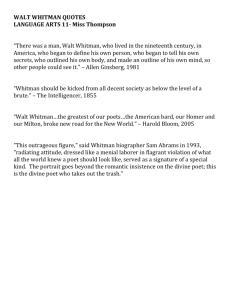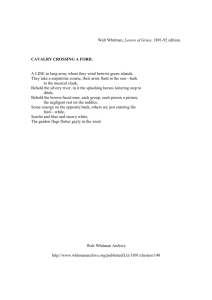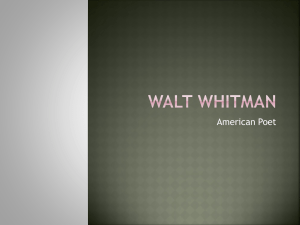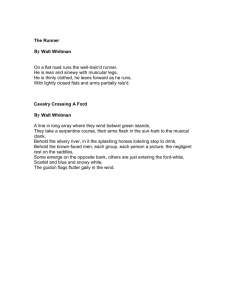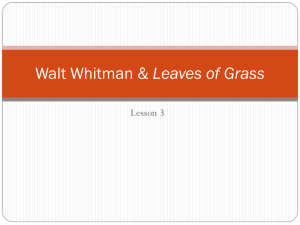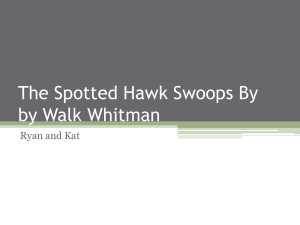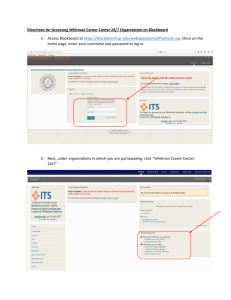Walt Whitman Intro
advertisement
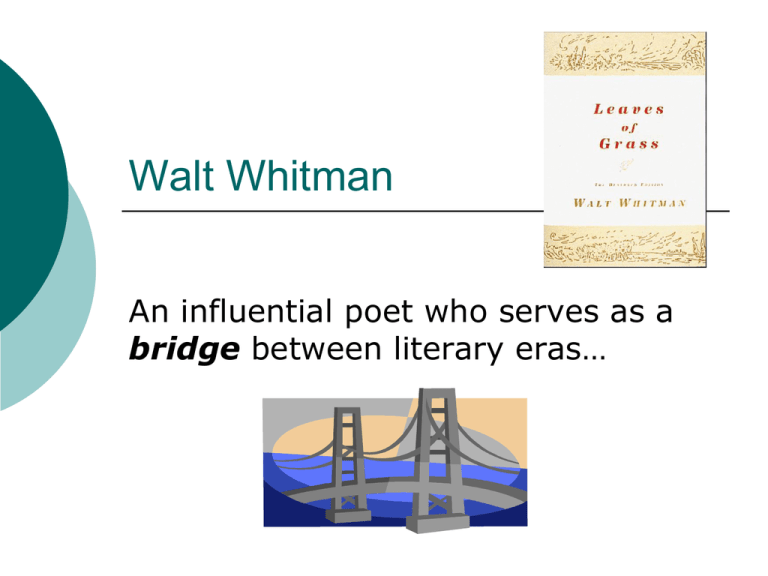
Walt Whitman An influential poet who serves as a bridge between literary eras… Walt Whitman (1819 -1892) Whitman was born in New York and lived an interesting life as a printer, a teacher, a journalist, a carpenter and eventually a field nurse in the Civil War. He was an avid reader, a friend and admirer of Emerson, and he eventually produced some of the most influential and well known American poetry. Pictures of Whitman… So why is this weird looking dude so important to American literature? Well… He lived, wrote, and thought both before, during, and after the Civil War. SO…… His work serves as an important bridge between the Romantic/Transcendental ideals of the early 1800s and the shifted viewpoint on life that predominated after the Civil War - Realism. With your partner… (One minute) What is the metaphor used to describe Whitman at the start of this presentation? Before today, had you heard of Walt Whitman? What did you already know about Whitman when you walked in the room? What are you most curious to learn about this influential American author? Whitman’s Work as a bridge: Connection to what was current… Transcendental values A heavy focus on communion with nature A desire to transcend common experience and gain a collective feeling of understanding and knowledge An optimistic Romantic belief in beauty, truth, and democratic values. Whitman’s Work as a bridge: Connection to what was current… An overall sense of optimism and enthusiasm for democracy and the American way of life. This is in line with Transcendental and Romantic thought. Whitman’s Work as a bridge: Connection to a new genre… His experience in the Civil War brings an element of real, sometimes horrible experience that was absent from most work at the time. His style signified an important departure from previous forms of poetry (which was often very scripted and reliant on certain forms). Whitman… The Father of Free Verse Free verse: unrhymed poetry that does not follow any SET rhyme or meter. (It can rhyme at times, but never in any set pattern) This was new in American poetry, and it is said that free verse mirrors the freedom of Americans to pursue their own happiness. A stanza from a traditional poem that is NOT written in free verse. Oh, better that her shattered hulk Should sink beneath the wave; Her thunders shook the mighty deep, And there should be her grave: Nail to the mast her holy flag, Set every threadbare sail, And give her to the god of storms, The lightning and the gale! From “Old Ironsides” by Oliver Wendell Holmes. Now a bit from Whitman in FREE VERSE. SPLENDOR of ended day, floating and filling me! Hour prophetic—hour resuming the past! Inflating my throat—you, divine average! You, Earth and Life, till the last ray gleams, I sing. From “Song at Sunset” by Walt Whitman Terms to know with Whitman… Cataloging: long lists in poems. Whitman uses extensive cataloging to build a sense of universality and commonality to his work. ALSO KNOW THE OLD STANDARDS: Simile Metaphor Imagery Now a bit from Whitman in FREE VERSE. SPLENDOR of ended day, floating and filling me! Hour prophetic—hour resuming the past! Inflating my throat—you, divine average! You, Earth and Life, till the last ray gleams, I sing. From “Song at Sunset” by Walt Whitman Whitman’s book of poetry Leaves of Grass Contains the majority of his work Whitman published the first several editions himself, and continued to edit and re-publish it until his death. It was said that Henry Wadsworth Longfellow, an important traditional American poet, threw his copy of the book into the fire. Whitman’s book of poetry Whitman loved to wander, absorbing the “fascinating chaos.” He recorded his observations and later turned them into poetry. Some of Whitman’s important works which we will read: “I Hear America Singing” “When I Heard the Learn’d Astronomer” “Song of Myself” (an excerpt) “Beat! Beat! Drums!” Ticket out the door. On your card… Define free verse. List two ways in which Whitman’s work is similar to that of the Transcendentalists. List two ways that his work was considered new and innovative. Ten at the End!! Pack up your things Pull out your books Quietly read for the last 10 minutes of class
